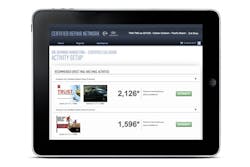Mark Zoba understands the confusion most consumers feel at the time of an accident. It’s disorienting, he says, and scary.
“[Their vehicle] is one of the largest investments they make,” he says, “and now, it’s wrecked, and they don’t understand the process of getting it fixed. They don’t know who to trust and who to work with or what to do.”
As the collision parts manager for Nissan North America, Zoba and his team have worked to solve this problem.
In October, Nissan launched its new On-Demand Marketing (ODM) tool for collision repair shops and vehicle owners. The concept is simple: Certified shops use the tool to market directly to Nissan vehicle owners; in turn, those drivers can use a mobile application to connect to Nissan’s network of certified repairers.
The certified program allows Nissan to put its stamp of approval on shops, Zoba says, and the tool allows Nissan owners to feel more in control of their repair decisions.
And Nissan isn’t alone. Detroit’s Big Three—Ford, General Motors and Chrysler—all plan on releasing similar offerings.
This marks an important shift in the importance placed on OEM certifications for repair shops, says Scott Biggs of the Assured Performance Network, which manages the certification programs for Ford, Chrysler and Nissan.
Even before the ODM tool was launched and now, moderately promoted, Biggs says the Nissan certification program generated more than 15,000 shop referrals each month.
“These new tools,” Biggs says, “are now going to put that certification in front of consumers. It builds a link from the vehicle owner to the OEM to the shop qualified to properly repair that vehicle.”
The ODM Tool
The marketing tool was created, Zoba says, in order to increase vehicle-owner awareness of the company’s certification program.
“The goal is to create that connection to where the vehicle owner knows there’s a certified shop in their network well before they ever need to use one,” he says.
From a customer perspective, the app serves as a database of all Nissan-certified shops with basic information about each. Vehicle owners can then search for shops in their local area at the time of need.
The tool itself provides value to shops in the form of direct marketing. Shops are not given customer information, but they can use the tool to send marketing messages to them.
“Shops can send ‘call-to-action’ type messages and offers that might advertise the shop’s premium rentals or other offers they have,” Zoba says.
Those messages can be sent via email or direct mail. It’s a turnkey offering for shops, Zoba says, that comes with the price of the APN certification program. Under the APN certification process, shops can become part of the Nissan, Ford and Chrysler network for a $2,950 annual fee, if they meet the given requirements after a thorough inspection process. Nissan has an additional $850 yearly marketing fee that includes but is not limited to the ODM offerings.
Consumers are now made aware of the ODM application when purchasing the vehicle.
Ford’s Paul Massie said his company is also releasing a similar application, but could not comment on any details until the official announcement is made. Biggs says Chrysler has one in the works, and a GM spokesman told FenderBender that they will also have a similar offering to be announced at a later date, possibly this fall.
Industry impact
OEM certifications have gained significant traction across the industry in recent years, as has been reported previously in FenderBender (“OEM Certifcations on the Rise,” August 2014, bit.ly/fbcertifications). Biggs expects to have more than 2,500 shops in the APN program by mid year, and Zoba feels it speaks to a shift in the OEM approach to collision repair.
“We want to make sure we’re taking care of the owner, that’s one thing—and, unfortunately, almost all of us as OEMs fall into this category—we haven’t done well in the past in terms of the collision repair process,” he says. “We viewed the collision repair aspect of our partnership [with the vehicle owner] as pretty much nonexistant; that was up to their insurer and the shop.
“That was a bad decision, and it was wrong. We must have a say in the repair of our vehicles. We want to make sure [vehicle] owners know their rights and get the right repairs. Quality repairs and a quality repair process leads to customer retention for us.”
And as CAFE standards have already begun to change the dynamic of vehicle manufacturing, Zoba says this only becomes more important.
“We need to promote a quality aspect in the marketplace that’s based on education, and that’s what we’re doing through the certification program,” he says. “Combined with our [ODM tool], we’re giving [vehicle] owners a level of confidence that we have identified those quality shops for them and that we’re taking care of them.”
About the Author

Bryce Evans
Bryce Evans is the former vice president of content at 10 Missions Media, overseeing an award-winning team that produces FenderBender, Ratchet+Wrench and NOLN.
